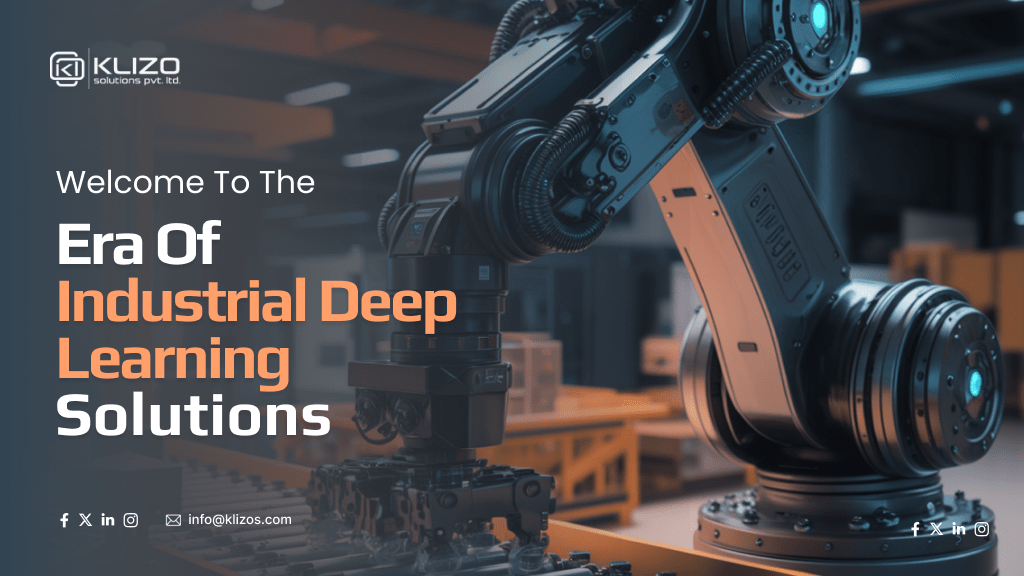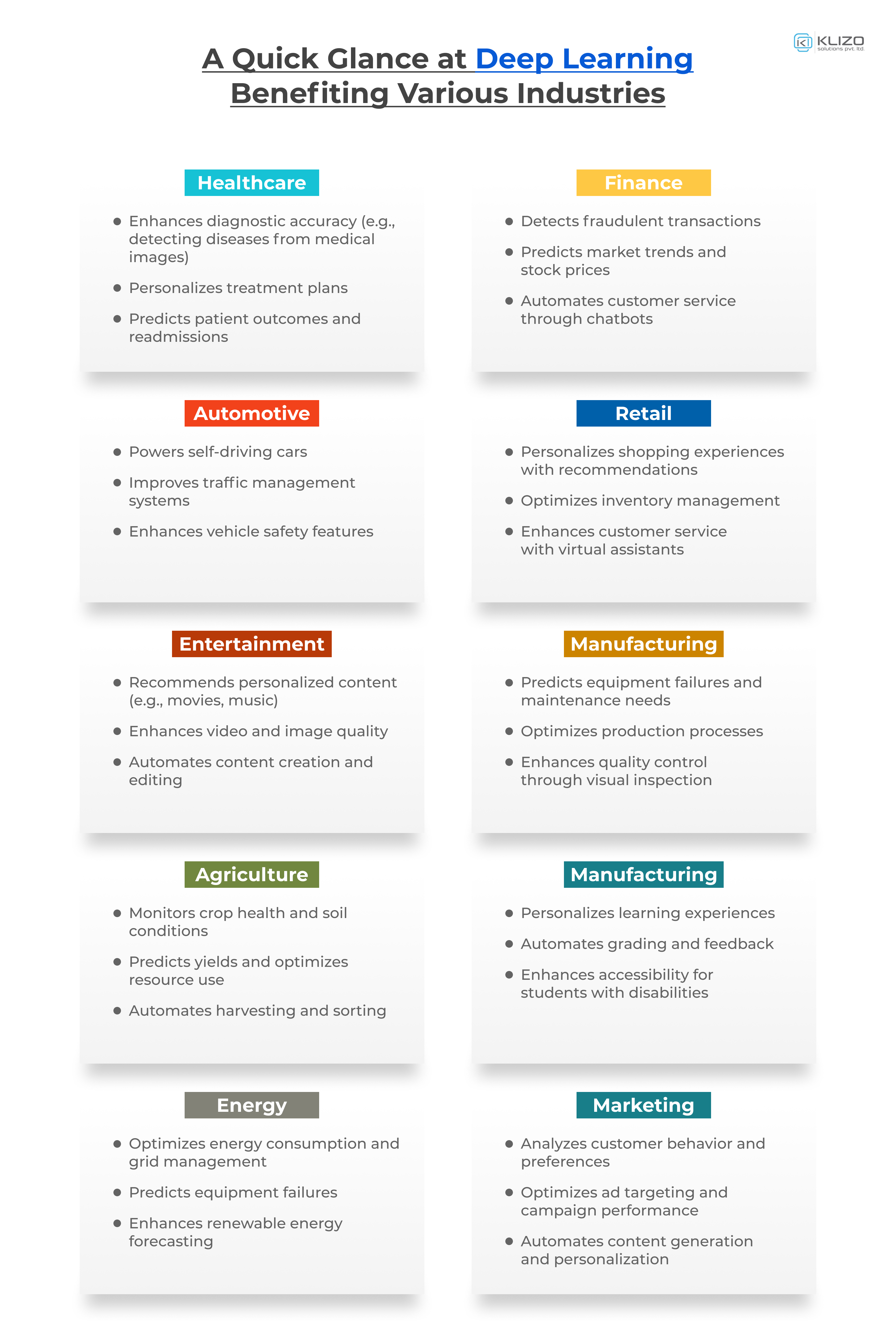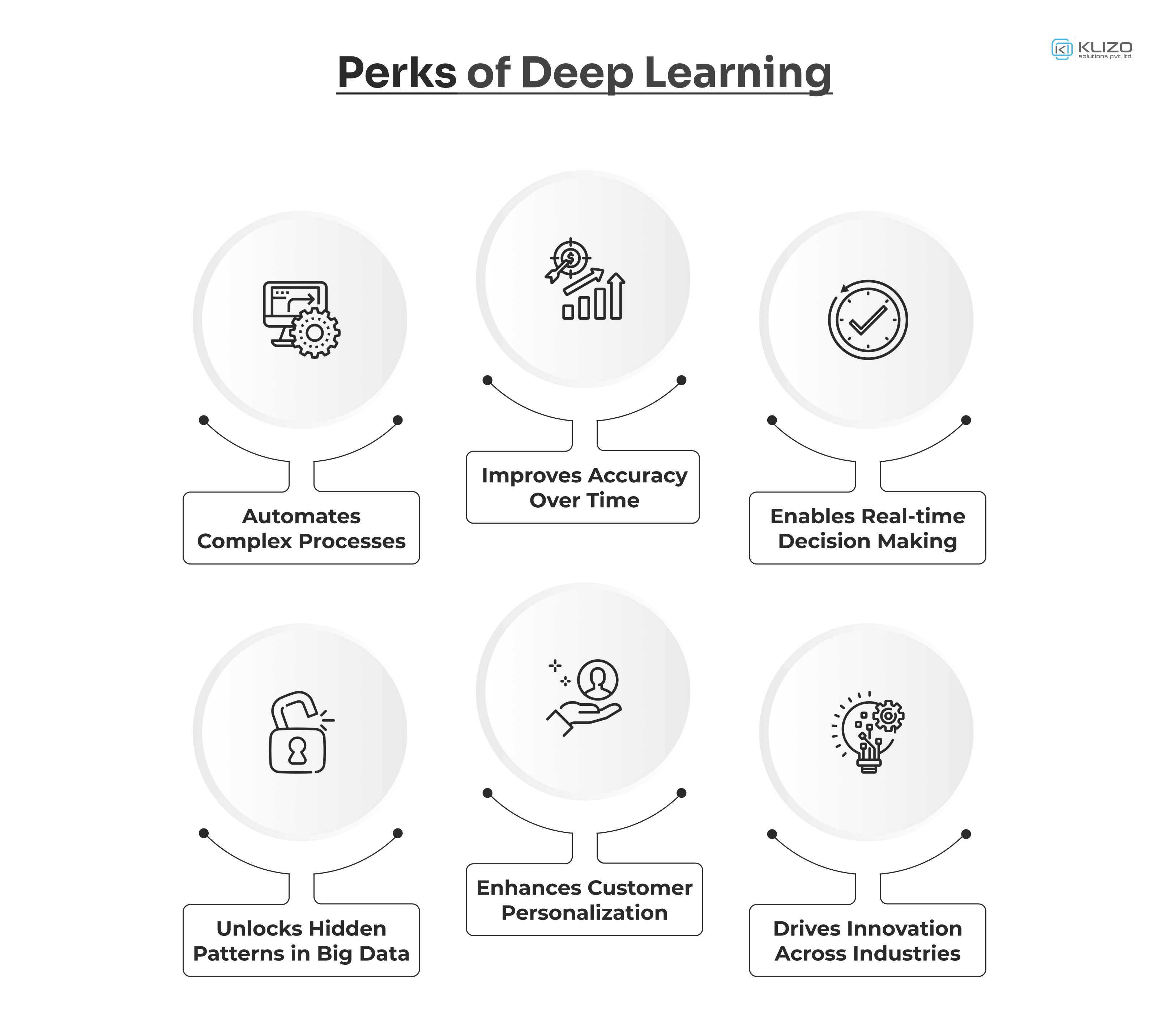


Imagine a world where machines not only learn from vast amounts of data but also make decisions that drive innovation across industries. Welcome to the realm of deep learning in industry!
From self-driving cars to personalized healthcare, deep learning transforms traditional industry solutions by enabling smarter, faster, and more efficient processes.
Industrial deep learning solutions are not just about automation anymore; it’s about revolutionizing how businesses operate at their core.
In this article, we’ll dive into how deep learning is making waves in industries and why industrial deep learning solutions are the game-changers we’ve all been waiting for!
A subset of artificial intelligence (AI), deep learning mimics the way the human brain processes information. It involves the use of neural networks, which are algorithms designed to recognize patterns, learn from data, and make decisions.
What makes deep learning so powerful is its ability to handle massive amounts of data and extract complex patterns without requiring explicit programming.
Think of it like this: while traditional programming might need specific instructions for every task, deep learning can “teach” itself to perform tasks by analyzing data, much like how a human brain learns through experience. This allows it to power things like voice assistants, facial recognition, self-driving cars, and even advanced healthcare diagnostics. Cool, right? Wait, there’s more!
The deep learning models can improve over time, making them incredibly useful for solving complex problems across various industries. The more data they are fed, the better they become at making predictions, identifying trends, and automating tasks. By continuously learning and adapting, deep learning technology in business is transforming various sectors by automating processes, optimizing operations, and providing data-driven insights.
For example, deep learning in healthcare solutions is now revolutionizing medical diagnostics, while financial forecasting with deep learning is helping businesses make more accurate predictions.
In short, deep learning is a game-changer in technology, enabling machines to achieve a level of autonomy and insight previously thought impossible!

Deep learning is transforming key sectors, driving innovation, and improving efficiency across industries. The use of deep learning in industry is unlocking new possibilities in areas like healthcare, finance, and manufacturing.
With the rise of industrial deep learning solutions, businesses can now leverage advanced data analysis and intelligent decision-making to optimize operations and stay competitive.
Let’s take a closer look at deep learning impact analysis on businesses and industries.
Deep learning is making profound strides in the healthcare sector by enhancing diagnostic accuracy, personalizing treatment plans, and accelerating drug development. How is deep learning transforming healthcare? Here’s how:
In the financial sector, deep learning is revolutionizing risk management, fraud detection, and customer experience, demonstrating significant deep learning benefits in finance:
Deep learning is driving significant advancements in the automotive industry, particularly in autonomous driving and vehicle safety. Why is deep learning important for automotive innovations? Here’s the impact:
Deep learning is revolutionizing the retail sector by transforming customer experiences, streamlining supply chain management, and personalizing interactions.
When it comes to deep learning in industry, retail stands out as a key area where AI can significantly enhance the shopping journey. By analyzing consumer behavior, deep learning enables retailers to create personalized shopping experiences, offering product recommendations and tailored discounts based on individual preferences.
Additionally, deep learning optimizes inventory management, predicting demand patterns to help businesses maintain ideal stock levels, preventing overstocking or shortages.
A notable innovation is visual search, where customers can upload images of desired products, and deep learning algorithms identify similar items in the retailer’s catalog, further enhancing the shopping experience.
In entertainment, deep learning is reshaping how content is created, delivered, and consumed. Platforms like Netflix and Spotify rely on deep learning in industry to analyze user behavior and recommend personalized content, increasing viewer engagement.
Beyond content recommendations, deep learning is driving innovation in special effects and deepfakes, pushing the boundaries of CGI in movies and TV shows. The technology creates lifelike characters and visual effects, improving the overall production quality.
Additionally, entertainment companies leverage audience analytics powered by AI to better understand viewing habits, enabling the creation of content that resonates with specific audiences, and increasing viewer loyalty and satisfaction.
In manufacturing, deep learning boosts productivity, ensures quality control, and reduces downtime.
In agriculture, deep learning is enabling more sustainable and efficient farming practices.
Deep learning in education is driving a significant transformation, fostering personalized learning and enhancing engagement between students and educators. As institutions strive to keep up with the digital age, industrial deep learning solutions are becoming integral to modern classrooms.
Adaptive Learning Platforms:
Automated Grading:
Virtual Tutors:
Deep learning in education is unlocking new possibilities, allowing educators to tailor experiences for individual learners. Through these innovations, teaching is evolving into a more data-driven, student-centric process.
In the energy sector, deep learning is reshaping how power is produced, distributed, and consumed. By adopting advanced industrial deep learning solutions, the energy industry is achieving higher efficiency, reducing environmental impact, and optimizing resources.
Marketing strategies are becoming smarter and more personalized thanks to deep learning. With industrial deep learning solutions, businesses can tap into customer insights and fine-tune their campaigns to boost engagement and ROI.
Targeted Advertising:
Sentiment Analysis:
Chatbots and Customer Engagement:
As deep learning reshapes industries, offering advancements like automation, data-driven insights, and innovation, many organizations face challenges when integrating industrial deep learning solutions. While the potential is enormous, understanding the hurdles is key to successful adoption across diverse sectors.
So, let’s have a quick look at them here: 
Industries like healthcare and finance, where sensitive data is abundant, face major concerns over privacy. With deep learning models relying on vast datasets, ensuring compliance with regulations and protecting confidential information is critical.
Training deep learning models demands significant computational power. For industries, such as manufacturing and automotive, the cost of infrastructure—hardware, storage, and processing—can be daunting.
The technical expertise required to develop and manage deep learning solutions is often lacking, leaving businesses struggling to find skilled professionals in AI and neural networks.
Integrating deep learning into legacy systems, particularly in the manufacturing and automotive industries, presents significant challenges. Existing infrastructures aren’t always compatible with advanced AI models, requiring custom solutions for smooth integration.
Ensuring fairness in model predictions, especially in finance and healthcare, is critical. Deep learning systems can unintentionally introduce biases, affecting decision-making and industry reputations.
To overcome the challenges of deep learning adoption, businesses must implement strategic solutions.
For example, one crucial aspect is data security, especially in industries like healthcare, where privacy concerns are significant. Implementing advanced encryption and data anonymization ensures compliance and mitigates risks. Cloud-based infrastructure also offers scalable, cost-effective solutions, essential for sectors like manufacturing, where benefits of deep learning in tech sectors help drive innovation while managing costs.
Also, addressing the skills gap through workforce training or collaborating with experts in industrial deep learning solutions is key for successful adoption. Custom solutions like middleware are vital for integrating deep learning into legacy systems, particularly for automotive innovations through deep learning and optimizing manufacturing processes.
Mitigating bias is critical, especially in finance, where deep learning improves financial forecasting, but fairness must be ensured. By partnering with experts adept in real-world deep learning applications, companies can fully harness this technology while addressing these challenges effectively.
As the deep learning revolution continues to unfold, industries are experiencing unparalleled advancements in efficiency, accuracy, and problem-solving capabilities.
From manufacturing optimization deep learning for predictive maintenance to deep learning in retail analytics for personalized customer experiences, the possibilities are just endless!
According to a recent report by McKinsey, companies leveraging AI and deep learning can boost their productivity by up to 40%. This shows how crucial deep learning technology in business is for staying competitive in today’s fast-evolving marketplace!
At Klizo Solutions, we understand the transformative power of deep learning in industry. That’s why we offer cutting-edge AI-driven, deep learning industry applications designed to help businesses harness this technology for innovation and growth!
Whether it’s optimizing operations, improving financial forecasting with deep learning, or enhancing customer experience, we can help you make the most out of the deep learning revolution.
Let’s build the future together! Contact us now!
Previous article
Rust vs Go: Know Which Language Excels in Performance and Safety
Joey Ricard
Klizo Solutions was founded by Joseph Ricard, a serial entrepreneur from America who has spent over ten years working in India, developing innovative tech solutions, building good teams, and admirable processes. And today, he has a team of over 50 super-talented people with him and various high-level technologies developed in multiple frameworks to his credit.

Subscribe to our newsletter to get the latest tech updates.